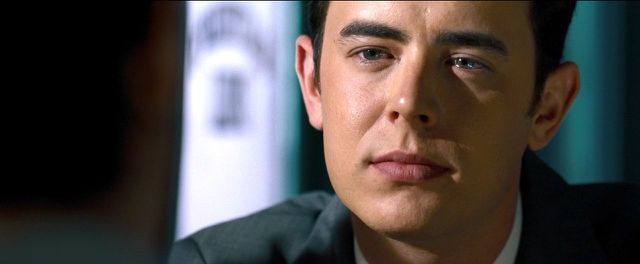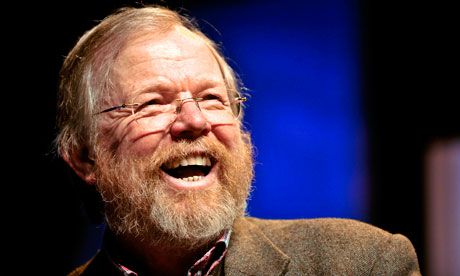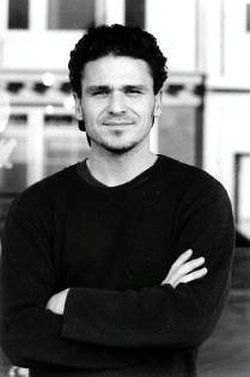
Colin Hanks
Colin Hanks is an actor and director best known for his roles in Orange County, The Assassination of Jesse James by the Coward Robert Ford, and King Kong.

Colin Hanks is an actor and director best known for his roles in Orange County, The Assassination of Jesse James by the Coward Robert Ford, and King Kong.

[via Twitter]
William McGuire "Bill" Bryson, OBE, FRS is a best-selling American author of humorous books on travel, as well as books on the English language and science.

[via Twitter]
Also recommended by: The Sklar Brothers, Yvette Nicole Brown
With almost 4 million copies sold over 50 years after its original publication, generations of readers have now journeyed with Milo to the Lands Beyond in this beloved classic that Philip Pullman says comes up bright and new every time I read it . . . it will continue to charm and delight for a very long time yet. And teach us some wisdom, too. Enriched by Jules Feiffers splendid illustrations, the wit, wisdom, and wordplay of Norton Justers offbeat fantasy are as beguiling as ever. For Milo, everythings a bore. When a tollbooth mysteriously appears in his room, he drives through only because hes got nothing better to do. But on the other side, things seem different. Milo visits the Island of Conclusions (you get there by jumping), learns about time from a ticking watchdog named Tock, and even embarks on a quest to rescue Rhyme and Reason. Somewhere along the way, Milo realizes something astonishing. Life is far from dull. In fact, its exciting beyond his wildest dreams! From the Hardcover edition.
[via Twitter]
Also recommended by: Greg Proops
Nineteen Eighty-Four, sometimes published as 1984, is a dystopian novel by George Orwell published in 1949.The novel is set in Airstrip One (formerly known as Great Britain), a province of the superstate Oceania in a world of perpetual war, omnipresent government surveillance and public manipulation, dictated by a political system euphemistically named English Socialism (or Ingsoc in the government's invented language, Newspeak) under the control of a privileged Inner Party elite, that persecutes individualism and independent thinking as "thoughtcrimes". The tyranny is epitomised by Big Brother, the quasi-divine Party leader who enjoys an intense cult of personality but who may not even exist. The Party "seeks power entirely for its own sake. We are not interested in the good of others; we are interested solely in power."The protagonist of the novel, Winston Smith, is a member of the Outer Party, who works for the Ministry of Truth (or Minitrue), which is responsible for propaganda and historical revisionism. His job is to rewrite past newspaper articles, so that the historical record always supports the party line. Smith is a diligent and skillful worker but he secretly hates the Party and dreams of rebellion against Big Brother.
[via Twitter]
Huxley's bleak future prophesized in Brave New World was a capitalist civilization which had been reconstituted through scientific and psychological engineering, a world in which people are genetically designed to be passive and useful to the ruling class. Satirical and disturbing, Brave New World is set some 600 years ahead, in "this year of stability, A.F. 632"--the A.F. standing for After Ford, meaning the godlike Henry Ford. "Community, Identity, Stability," is the motto. Reproduction is controlled through genetic engineering, and people are bred into a rigid class system. As they mature, they are conditioned to be happy with the roles that society has created for them. The rest of their lives are devoted to the pursuit of pleasure through sex, recreational sports, the getting and having of material possessions, and taking a drug called Soma. Concepts such as family, freedom, love, and culture are considered grotesque. Against this backdrop, a young man known as John the Savage is brought to London from the remote desert of New Mexico. What he sees in the new civilization a "brave new world" (quoting Shakespeare's The Tempest). However, ultimately, John challenges the basic premise of this society in an act that threatens and fascinates its citizens. Huxley uses his entire prowess to throw the idea of utopia into reverse, presenting us what is known as the "dystopian" novel. When Brave New World was written (1931), neither Hitler nor Stalin had risen to power. Huxley saw the enduring threat to society from the dark side of scientific and social progress, and mankind's increasing appetite for simple amusement. Brave New World is a work that indicts the idea of progress for progress sake and is backed up with force and reason.

[via Twitter]
Steve Martin has been an international star for over thirty years. Here, for the first time, he looks back to the beginning of his career and charmingly evokes the young man he once was. Born in Texas but raised in California, Steve was seduced early by the comedy shows that played on the radio when the family travelled back and forth to visit relatives. When Disneyland opened just a couple of miles away from home, an enchanted Steve was given his first chance to learn magic and entertain an audience. He describes how he noted the reaction to each joke in a ledger - 'big laugh' or 'quiet' - and assiduously studied the acts of colleagues, stealing jokes when needed. With superb detail, Steve recreates the world of small, dark clubs and the fear and exhilaration of standing in the spotlight. While a philosophy student at UCLA, he worked hard at local clubs honing his comedy and slowly attracting a following until he was picked up to write for TV. From here on, Steve Martin became an acclaimed comedian, packing out venues nationwide. One night, however, he noticed empty seats and realised he had 'reached the top of the rollercoaster'. BORN STANDING UP is a funny and riveting chronicle of how Steve Martin became the comedy genius we now know and is also a fascinating portrait of an era.

[via Twitter]
Dave Eggers is an American writer, editor, and publisher. He is known for the best-selling memoir A Heartbreaking Work of Staggering Genius and for his subsequent work as a novelist and screenwriter.